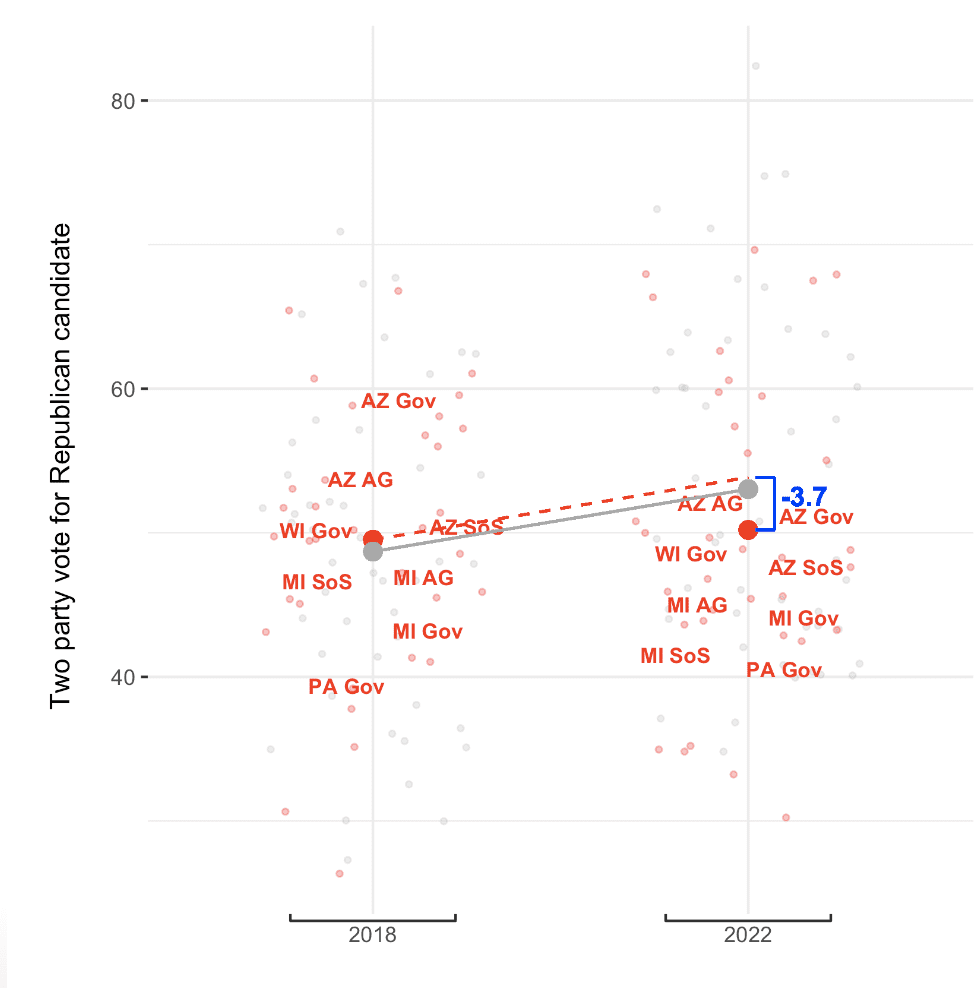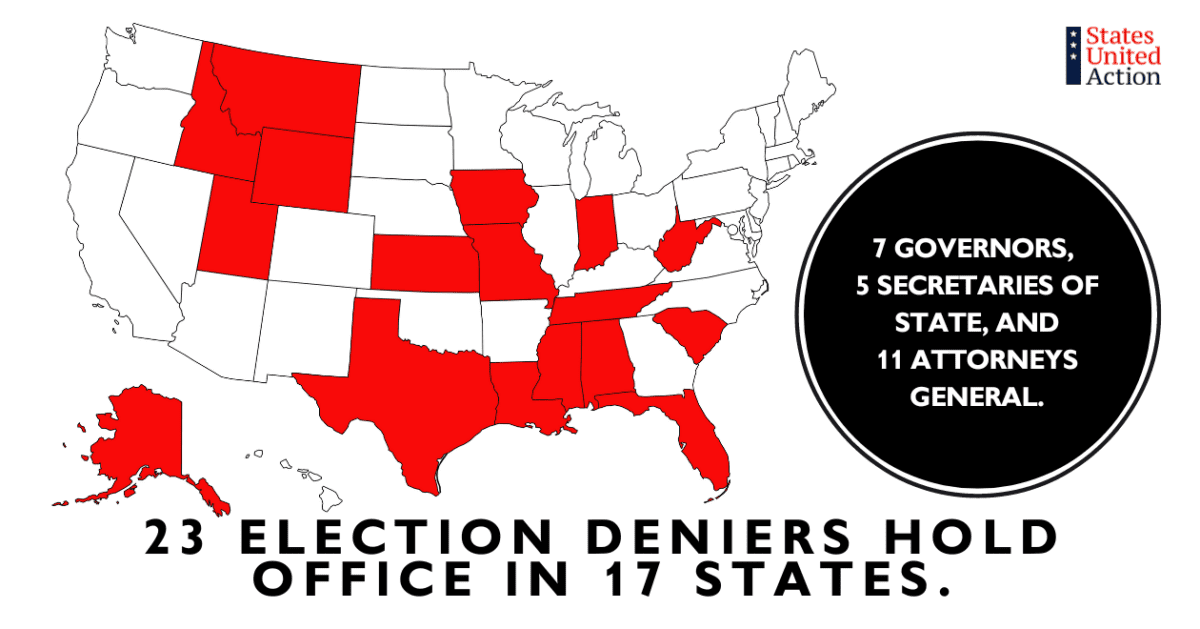Bad Politics, Bad Policies: Election Denial in 2023
A review of Election Deniers’ actions after their first 100 days in office reveals new anti-democracy trends in the states post-2022 elections.
Last updated: April 28, 2023
A project of States United Action
Election Deniers were broadly defeated last year in races for statewide positions that oversee voting. Running as an Election Denier cost statewide candidates these races in key states across the country.
While that’s good news for our democracy and especially for voters in those states, our free and fair elections remain at risk. As we emphasized during the 2022 Midterms, one Election Denier in office is dangerous—and 15 Election Denier candidates did win races for governor, secretary of state, and attorney general. When they were sworn in, they joined eight Election Deniers who were already in office. In all, 23 Election Deniers now hold election oversight positions in 17 states.
The Election Denier movement is clearly still a threat, and one that continues to evolve. Those who took office in 2023 are now at the 100-day point of their administrations, and their actions thus far tell us a lot. Election Deniers who hold statewide office have begun to chip away at nonpartisan election administration and the security of voting. At the same time, Election Deniers who failed in their campaigns last year are exerting power outside of government to disrupt democracy, discredit elections, and raise money to keep election denial part of the conversation.
In order to comprehend what happened in 2022 and what election denial looks like in this new era, it’s important to understand what happened at the ballot box and what is happening with election administration today. In a new analysis, States United Action found that Election Denier candidates paid a measurable electoral price specifically because they endorsed lies and conspiracy theories about elections. This research offers a lesson for the future: When voters understand the role candidates will play in our free and fair elections, they step up to defend democracy and reject Election Deniers.
Key Takeaways
- Currently, 23 Election Deniers now hold election oversight positions in 17 states.
- Election Denial continues to shape our election landscape in dangerous ways, from both inside and outside of elected office.
- States United research shows that in races for state offices that oversee voting, Election Denier candidates received 2.3 to 3.7 percentage points less of the vote than expected, compared with similar candidates in similar races.
A review of Election Deniers’ actions after their first 100 days in office reveals new anti-democracy trends in the states post-2022 elections. However, one significant trend from the midterms remains critical: most voters did not trust Election Deniers with their votes.
States United found that in 2022, Election Denier candidates who ran for statewide office paid a penalty at the ballot box for their embrace of election lies. Our research shows that in races for state offices that oversee voting, Election Denier candidates received 2.3 to 3.7 percentage points less of the vote than expected, compared with similar candidates in similar races.
Think of it as an Election Denier penalty. Voters rejected candidates specifically because those candidates refused to support free and fair elections. It was enough to flip five to seven races away from Election Deniers and to their opponents. We also find that at least one Republican candidate who was not an Election Denier won their race because they did not embrace election lies, and therefore did not suffer the same penalty.

Our research also shows that Election Deniers did not have a direct effect on voter turnout in these races, suggesting that the Election Denier penalty was largely driven by vote-switching. Voters who otherwise would have voted for the Republican candidate instead voted for the Democrat when the Republican was an Election Denier. (Note: In 2022, Election Denier statewide candidates were all running on the Republican ticket; not all Republicans running were Election Deniers.)
These findings square with polling that States United conducted just before the election in key states. A plurality of voters (43 percent) across Arizona, Michigan, Pennsylvania, and Wisconsin reported that they would be less likely to vote for a candidate who believed the 2020 election was stolen from Donald Trump. That was also true of the voters who often swing elections—independents and those who don’t vote every cycle. The more voters learned about Election Deniers, the less popular they were. And voters said that they were particularly concerned about certain Election Denier behavior, specifically if a candidate participated in the January 6 insurrection, encouraged people to threaten election officials, or spread conspiracy theories about our election system.
In all, 23 Election Deniers now hold office in 17 states—7 governors, 5 secretaries of state, and 11 attorneys general. As these officials pass the 100-day mark of their current terms, some discouraging themes are emerging about their past and current priorities for election administration.

Some Election Deniers, citing disinformation and conspiracy theories, are withdrawing their states from the Electronic Registration Information Center (ERIC), a widely praised, nonpartisan membership organization of state election officials that bolsters election security by helping maintain accurate and up-to-date voter rolls for member states. Bipartisan current and former election officials have expressed concern that these withdrawals will leave elections less secure.
Election Denier officials are also moving to restrict resources and funding support to local election administrators, further hampering state and local offices that are already underfunded. Other officials are creating or expanding special units to investigate and prosecute election crimes — again while pushing claims of widespread voter fraud.
Election Deniers who won their races for statewide office are:
-
Pulling out of ERIC
This has happened so far in six states with Election Denier state officials:
- Alabama – Governor Kay Ivey; Secretary of State Wes Allen
- Florida – Governor Ron DeSantis; appointed Secretary of State Cord Byrd
- Iowa – Governor Kim Reynolds
- Louisiana – Attorney General Jeff Landry
- Missouri – Secretary of State Jay Ashcroft
- West Virginia – Secretary of State Mac Warner
Ohio Secretary of State Frank LaRose, a non-Election Denier, also took action resulting in Ohio leaving ERIC.
-
Moving to outlaw private donations to support election funding.
- Montana Governor Greg Gianforte, an Election Denier, is working to pass SB 117 to ban outside funding support for elections. If it passes, Montana will become the 25th state to ban private donations since 2020.
- Many of these bills have been signed and supported by Election Deniers, including in:
- Alabama – Governor Kay Ivey signed HB 194 on 4/13/22
- Florida – Governor Ron DeSantis signed SB 90 on 5/6/21
- Missouri – Secretary of State Jay Ashcroft supported HB 1606, which was signed by Governor Mike Parsons on 6/29/22; HB 1878 signed on 5/18/22
- Tennessee – Governor Bill Lee signed SB 1534 on 5/18/21
- Two states with Election Denier statewide officials have moved to restrict private donations to support election funding.
- Texas – Governor Greg Abbott signed SB 7 on 6/18/21, which prohibits local officials from accepting donations above $1,000 without approval from state officials.
- West Virginia – Secretary of State Mac Warner supported HB 4097, which was signed on 3/30/22. The bill limits donations to be used only by the State Election Commission.
- This trend also extends beyond states with Election Denier officials. However, of the 24 states that have banned or restricted private donations to support election funding, half (12) currently have at least one Election Denier in a statewide role.
-
Creating, or expanding, election investigation units and prosecutions.
- Under Governor Ron DeSantis, Florida this year expanded its ability to prosecute election-related charges. In Texas, in addition to the “election integrity unit” created by Governor Greg Abbott, criminal investigations of the people who run elections have risen under Attorney General Ken Paxton.
- Two examples of non-Election Denier officials also pursuing this are Governor Sarah Huckabee Sanders in Arkansas and Secretary of State Frank LaRose in Ohio.
- Some states are taking a different approach. For example, Arizona’s Election Integrity Unit has been redirected to address voter suppression under new leadership from Attorney General Kris Mayes. The unit was created by former attorney general Mark Brnovich, a Republican who ran unsuccessfully for the U.S. Senate last year, to investigate voter fraud complaints in Arizona, a battleground state.
At least 141 Election Deniers entered races last year for governor, attorney general, or secretary of state. All but 15 lost. Many of these failed candidates, however, are finding ways to continue influencing our elections and keep election denial front and center. By seeking control of state parties, raising large amounts of money off election lies, and exploring future runs for office, these Election Deniers continue to threaten our democracy from outside the halls of government.
Election Deniers who lost their races for statewide office are:
-
Running for and winning leadership positions in state and national party organizations.
- Kristina Karamo (MI) elected chair of Michigan GOP
- Sigal Chattah (NV) was elected Republican national committeewoman
- Dave Williams (CO) was elected as leader of the Colorado GOP
-
Continuing to fundraise off of election lies.
- Kari Lake (AZ) continues to fund raise off of her gubernatorial loss
- Mark Finchem is continuing to fundraise under false pretenses
-
Exploring candidacy for other offices, most specifically the U.S. Senate.
- Kari Lake (AZ) is considering a run for the U.S. Senate in 2024
- Tudor Dixon (MI) will not rule out running for Sen. Debbie Stabenow’s seat in 2024
- Lee Zeldin (NY) is making public statements suggesting he may run for another office
- Doug Mastriano (PA) is considering a run for the U.S. Senate in 2024
For the majority of Election Denier candidates, lying about our elections wasn’t just bad for democracy, it was bad for them politically. Voters imposed a clear cost for election lies in statewide races where these candidates were running to oversee elections. As a result, voters in what were some of the most closely contested states in the 2020 presidential election cycle refused to give the keys to their elections over to those who threatened to undermine their votes.
However, Election Deniers are clearly not stopping or slowing down post-2022 losses. Election Denial continues to shape our election landscape in dangerous ways, from both inside and outside of elected office.